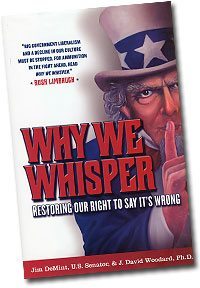
With the advance of radical secularism into practically every sector of public life, America may seem doomed to an agnostic future that would further degenerate morality and undermine its economy and future position in the world.
Such is the danger pointed out in Why We Whisper: Restoring Our Right to Say It’s Wrong, a recent book authored by U.S. Senator John DeMint and Doctor J. David Woodard, holder of the Strom Thurmond Chair of Government at Clemson University.
Why We Whisper argues that in government there is no such thing as neutrality on religious matters. Rather, the secularists – or progressives – who continually challenge any public expression of faith adhere to their own godless religion that aims to “shake the culture from its Judeo-Christian foundations and replace the ideas of the Founders with a new ethic based on evolutionary humanism and historic progress.”
Two tenants of this “faith” are radical egalitarianism that seeks to impose, not just equality of opportunity, but equality of outcome, regardless of success, and radical individualism that demands any form of personal gratification without governmental interference.
To impose their beliefs, secular-progressives use different means, readily at their disposal. These include: media character assassination and lawsuits pushed by groups like the ACLU, dubbed “para-governmental” organizations. These use intimidation and often resort to continuing legal proceedings they know will lose, simply to exhaust their opponents’ resources. Fear of these wars of attrition bullies would be opponents into silence and retreat at the first threat of action.
Thus, the majority of America’s citizens are driven by religious convictions of right and wrong, but afraid to voice their opinions in any way other than a whisper.
Secular-progressives do not limit themselves to public policy and government institutions, but also want to limit the activities of private groups as well, such as: The Boy Scouts of America, private and parochial schools, businesses and even church groups.
Their efforts silence discussion about moral absolutes, the existence of which they adamantly deny. The secular-progressives wish to abolish the very notions of right and wrong, or good and evil, replacing them with a universal tolerance of all things except traditional beliefs and restrictions on behavior.
In addition to the negative effect this has on the moral structure of society, it also costs Americans dearly in dollars and cents. One chapter of Why We Whisper outlines the annual expenses caused by governmental penalization of marriage and promotion of extra-marital sex, cohabitation, unwed births, divorce, abortion, pornography, same-sex “marriage” and gambling. The direct cost of these policies is $500 billion, while inclusion of indirect costs caused by them tops out at $2 trillion! That likely exceeds the entire federal budget.
Nevertheless, the secular-progressives are intent on expanding these policies, rather than allow government groups and officials, or even individuals to practice their First Amendment right and call certain behaviors wrong.
The authors’ solutions include a list of governmental policy changes, but also measures that everyone can immediately put into practice.
For example, Americans need to refuse to be bullied by secular-progressives and publicly proclaim their beliefs with their words and their votes. This would inspire countless members of the “fearful majority” to break their silence and speak openly about their faith and against moral degeneration.
The argumentation and facts presented in Why We Whisper are invaluable and well documented. It is a must read for those who feel isolated and hopeless as the traditional America they love is dismantled before their eyes.
That is not to say that the TFP endorses all the book’s conclusions. The authors are highly critical of the Catholic Church’s actions regarding the sexual abuse scandals, which were in fact an example of the authors’ theories about media propaganda.
Their authors contention that the Catholic Church “allowed gay networks” to use “the priesthood as cover for their sexual acting out,” disregards the numerous Vatican documents that condemn homosexuality and the admittance of homosexuals into seminaries.
Also offensive was the blame the book puts on the Church for instilling treatment of the clergy, the authors call: “far too deferential.”
Furthermore, the book’s position that America’s faithful can coalesce around a vague, nondenominational agreement on the existence of God and morality is utopic.
Nevertheless, the TFP applauds Senator DeMint and Doctor Woodard for breaking the silence and decrying the secularist religion that is steadily growing in America. As they say, in religious matters there is no such thing as neutrality. This nation must decide to be for God, or against Him. May God help America to make the right choice.

